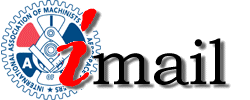 www.goiam.org
www.goiam.orgTuesday, February 12, 2002
Voting
Begins For UAL Mechanics
IAM members at United Airlines
will cast ballots today on a contract offer that could raise pay for the
mechanic’s group at United to the top of the industry.
The outcome is in doubt despite wage hikes proposed by a Presidential
Emergency Board appointed to make settlement recommendations in the high
profile dispute. Current pay for the 13,000 mechanic and related
employees is frozen at 1994 rates.
“The decision is now in the hands of the membership, where it
belongs,” said IP Tom Buffenbarger who addressed the issue in a speech
before the National Press Club. “If the
contract is rejected, I will call on United to reconvene negotiations
immediately. We would have seven days to reach a new accord and I
believe such an effort would be in the best interest of United’s
employees, shareholders and passengers.”
“The IAM will fully support the decision of the membership at
United,” added Transportation GVP Robert Roach, Jr.
Results of the nationwide vote will be available by late Tuesday or
early Wednesday and will be posted at www.goiam.org
and at www.iam141m.org.
Senate
Tosses a Bone to Jobless Workers
Jobless workers got
short-term help when the Senate extended unemployment benefits for an
additional 13 weeks, but Republican legislators deep-sixed a more
worker-friendly stimulus package. The Senate’s Democratic leadership
thought it had an acceptable compromise package, but the measure fell
four votes short of the 60 needed to pass the package—thanks to some
crafty GOP parliamentary sleight-of-hand.
The legislation would have granted some tax rebates to low-income
families who didn’t qualify for last year’s rebate, provided some
tax breaks for business investment and funneled additional Medicare
funds to states struggling with massive budget shortfalls.
The Bush administration and most Senate Republicans demanded even more
corporate tax breaks, but that GOP plan sank without a trace. The
jobless benefits extension now rests in the House, where Republican
leaders say they will try to add the corporate tax breaks which failed
to pass Senate muster.
U.S.
House
Tiptoes Towards
Campaign Finance Reform
Debate opens on campaign
finance reform this week as the House gingerly approaches the issue. The
debate promises to be lively, contentious and fractious. With an
election looming this November, House members face difficult choices in
weaning themselves away from the campaign largesse that has fattened
their coffers and eased their paths to re-election.
At the same time, the ever-widening Enron scandal lurks in the
background like the proverbial 800-pound gorilla and casts a dark shadow
over the debate. Enron’s PAC and individual executives shoveled more
than $1.7 million into campaigns during the 2000 political cycle, with
most of it flooding into GOP coffers. Perhaps that’s one of the
reasons that Speaker Dennis Hastert and other Republican House leaders
adamantly oppose efforts to dam that deluge.
Jobless
Figures Bad News for Workers
Labor Department figures
show that more than 89,000 manufacturing jobs went down the tubes last
month, bringing the jobless rate in that battered sector to 6.6 percent.
The White House touted a slight drop in the official rate—to 5.6
percent—as evidence its policies were beginning to pull the nation out
of recession. In fact, the number of Americans looking for jobs, and
those too discouraged to look, soared to 10.5 percent.
A stunning one in 10 American workers wants work but cannot find
a job.
Since the Bush Recession began last March, 1.4 million Americans have
become jobless. In the face of these dismal statistics, the White House
demands deeper tax cuts for the corporate sector and wealthy taxpayers,
an expanded “free trade” zone for all of the Americas and a free
hand in spending the Social Security-Medicare surpluses so painstakingly
built up in the recent past.
At the same time, jobless workers remain unemployed longer than they did
just a year ago. The number of unemployed workers who have been jobless
for at least 15 weeks was 88 percent greater than last year. About
860,000 workers exhausted their regular unemployment insurance over the
last three months of 2001.